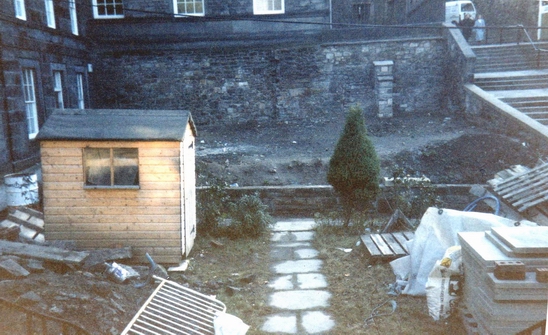

See a transcription.
The first evidence of Brown's Place is this notice in the Scotsman offering it for sale, along with the adjoining buildings in the Grassmarket. Brown's Place is described as 'newly built' though it is already occupied by James Brown and others.
Lot II would appear to be Nos 3 and 1. The 'six small houses connected by a stair behind' seem to have disappeared. They may be visible in one of the photographs with washing hanging out of the window. Lot III is clearly Nos 2, 3 and 4.

Before about 1867 the Vennel was a continuous slope without even any handrails to assist the climber. Negotiating it in icy weather must have been nearly impossible.
Note the large tree in Brown's Place garden

See a transcription.
In 1867 the Cattle Market was on the site of the Art College and the Corn Market was at the foot of the Vennel. The Vennel was therefore a busy thoroughfare, especially for farmers. Perhaps as a result of the Scotsman's campaign, hand rails seem to have been introduced at about this time.

In the late 19th century, the Grassmarket was a very poor area. The notice on Browns Place advertises rooms to let, and washing hangs from poles above the Vennel.
At this time the Vennel was rather better supplied with railings than it is now.

The Vennel as it was before the steps were constructed and the house on the right, of which nothing remains but marks in the wall, demolished. This was probably in 1922 when several buildings in the Vennel and 3 Brown's Place were condemned under an Improvement Act.

Another view of about the same date, taken from higher up Vennel and showing the tower of the Flodden Wall. It is notable, in contrast to today, that though the area is poor, the paving is in excellent repair.

See a transcription.
This advertisement shows that Brown's Place was still being sold as a unit in 1947. The auction was later cancelled.

As part of a comprehensive improvement scheme, for which various public bodies, including the City Council, the Old Town Renewal Trust and the Scottish Development Agency as well as adjoining proprietors provided a large proportion of the funding, the walls and railings were repaired, gates were fitted restricting access from the Vennel, the paths repaved, and the concreted area outside No 5 returned to gardens. The back green behind No 4 was also tidied and replanted.